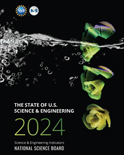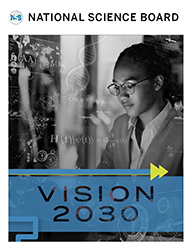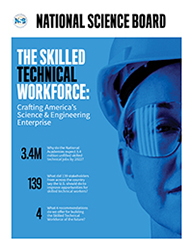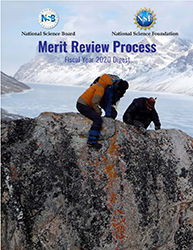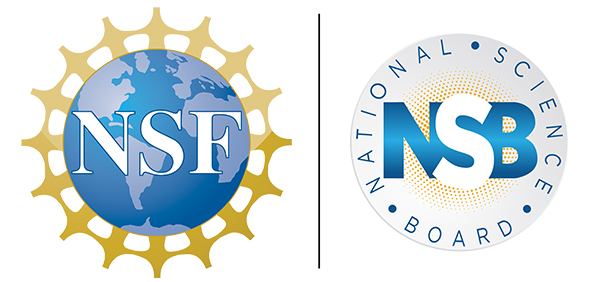
New report shows U.S. and China are world’s top producers of Knowledge-and tech-intensive industries
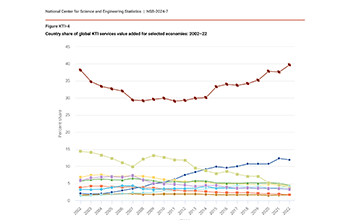
Country share of global KTI services value added for selected economies: 2002-2022. (Credit and Larger Version)
April 22, 2024
Globally, knowledge- and technology-intensive industries (KTI) produced $11.1 trillion in value added in 2022, with the United States and China leading the world as the top producers ($3.0 trillion and $2.9 trillion, respectively), each representing over a quarter of global KTI value added. The United States continues to lead in KTI services industries output, reaching a global value added share of 40% in 2022. These are among the findings in Production and Trade of Knowledge- and Technology- Intensive Industries, published today by the National Science Board (NSB).
Prepared by the National Center for Science and Engineering Statistics under NSB guidance, this report is part of the 2024 edition of the congressionally mandated Science and Engineering Indicators report on the state of the U.S. science and engineering enterprise.
While the U.S. is a leader in semiconductor innovation and R&D, U.S. semiconductor production (18% of global semiconductor production) lags other top producers, such as China (32%).
“Domestic semiconductor production strengthens key supply chains, lowers costs, and spurs training and employment of a new generation of skilled workers,” says NSB member Suresh Babu. “The 2022 CHIPS and Science Act’s big investment in the U.S. semiconductor industry is helping fuel semiconductor production in the U.S. – but we still need investments in STEM talent at all levels and across the country to take advantage of this opportunity and stay economically competitive.”
KTI industries are important for R&D investment and competitiveness and addressing policy challenges ranging from national security and energy sustainability to health and communications. These industries fuel the economy by producing and supporting innovative technologies and products and compete in a changing environment for industrial production.
Other Findings:
- The United States is the world’s largest producer of KTI services while China is the largest producer of KTI manufacturing.
- The U.S. had the largest 2022 global shares of value added in two KTI manufacturing industries – air and spacecraft (57%) and medical and dental instruments (37%).
- In 2021, the U.S. exported $193 billion in KTI-related services for a trade surplus of $102 billion in these services.
- U.S. KTI production is concentrated in a few states, with the top five states accounting for about half of U.S. KTI value added in 2021. California accounts for the largest share (25% in 2021) followed by Texas (8%), Washington (6%), New York (5%), and Massachusetts (5%).
Production and Trade of Knowledge- and Technology- Intensive Industries is the eighth of 10 Science and Engineering Indicators reports that the NSB will publish over the coming months through spring of 2024.
About Science and Engineering Indicators
Science and Engineering Indicators is a congressionally mandated report on the state of the U.S. and international science and engineering enterprise. Indicators provides high-quality quantitative information on the enterprise in a series of reports and a data tool that provides state-level data.
About the NSB
The National Science Foundation Act of 1950 charged the NSB with two roles: to be the governing board of the NSF and an advisor to Congress and the President on policy matters related to STEM research and STEM education. Selected for their distinguished service and accomplishments in academia, government, and the private sector, the Board’s 24 presidentially appointed members are leaders in STEM research and education.
About the NCSES
NSF’s National Center for Science and Engineering Statistics (NCSES) is the nation's leading provider of statistical data on the U.S. science and engineering enterprise. As a principal federal statistical agency, NCSES serves as a clearinghouse for the collection, interpretation, analysis, and dissemination of objective science and engineering data.
Media Contact: Andrew Zeidell, National Science Board, (703) 292-2434, azeidell@nsf.gov
Useful NSB Web Sites:
Home Page: http://www.nsf.gov/nsb
Media Contact: http://www.nsf.gov/staff/staff_bio.jsp?lan=nlymn&org=NSF
News: http://www.nsf.gov/nsb/news
Meetings: http://www.nsf.gov/nsb/meetings
Publications: http://www.nsf.gov/nsb/publications
Facebook: https://www.facebook.com/NationalScienceBoard
Twitter: Twitter: https://twitter.com/intent/user?screen_name=NSF_NSB
YouTube: https://www.youtube.com/channel/UCkrHRzuGSrPp2haQs0T_Pww
To view PDF documents, please download Adobe Acrobat Reader.
